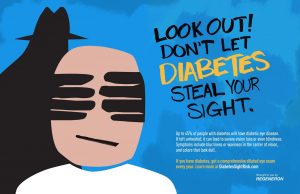Eye health
If you have diabetes, it is likely that you will develop some changes to your eyes.
Diabetes sometimes causes the focusing ability of the eye to weaken or to vary from day-to-day however; this problem eases when blood glucose levels are stable.
Diabetes can also cause vision loss from Diabetes Retinopathy (damage to the very small blood vessels on the back of the eye).
Diabetic Retinopathy
Diabetes and your eyes
The risk of developing diabetic retinopathy increases with the length of time you have had diabetes. The risk is also increased when blood glucose levels are not well controlled over time. Good blood glucose levels and blood pressure, and regular comprehensive eye examinations can greatly reduce the risk of developing diabetic retinopathy but it does not eliminate it.
Diabetic Retinopathy can occur regardless of the type of diabetes you have, your age, or even the control you have over your blood-glucose levels. It’s best to have regular eye examinations so that changes can be detected and treated early. People who have diabetes should have their eyes checked from when diabetes is first diagnosed, and then regularly checked every two years.
Symptoms Diabetic Retinopathy
If you notice any changes in your vision contact your doctor. Some examples of symptoms of Diabetic Retinopathy include:
Blurred, distorted or patchy vision that can’t be corrected with prescription glasses
Problems with balance, reading, watching television and recognising people
Being overly sensitive to glare
Difficulty seeing at night.
In the early stages of Diabetic Retinopathy there may be no symptoms and the disease may not be diagnosed until it is advanced.
Double vision
This is a rare complication of diabetes. Double vision is usually temporary but it may last for a few months. An optometrist can help treat it while it has effect. Diabetes is not the only cause of double vision.
Looking after your eyes
To look after your eyes and help prevent vision loss:
Have your eyes checked regularly, at least every two years, to pick up early signs of damage
Control your blood glucose levels.
Maintain a healthy blood pressure and cholesterol levels
If your vision has been affected, seek treatment from your doctor to stop it from getting worse.
Who can test your eyes?
Initially your doctor may test your eyes and if needed refer you to an optometrist or a specialist.
Treatment
If the damage is detected before it has affected your sight, treatment can prevent vision loss. Where vision loss has already occurred, treatment can only stop it from getting worse.
For more information or to book in please contact us.
It is important you have a dilated eye exam every 12 months.
Read more about how diabetes can effect your eyes https://www.diabetesaustralia.com.au/eye-health. Call us on 97961966 or visit www.eyesataustralind.com to book in









